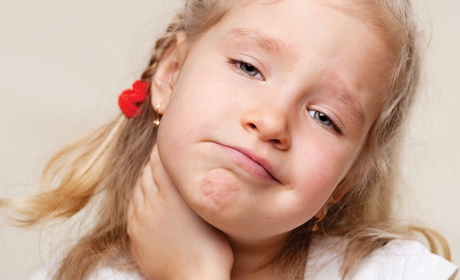Does it seem like you need to clear your throat all the time? This is a common complaint by patients to ENT doctors. Although there are no other symptoms but mucus in your throat, it can really be very annoying to you as well as to others. Some are also bothered by phlegm in throat after eating, which causes them to constantly clear their throats.

What Causes Mucus in Throat After Eating?
Allergy
Although rare, food allergy or sensitivity can cause irritation to the throat, leading to excessive mucus production. The most common cause is eating eggs and dairy products, as well as rice, wheat or soy. Other foods to avoid to prevent mucus after eating include fried foods, oily foods, alcohol and caffeinated drinks, which can irritate your throat or dry up the mucus and prevent its drainage.
Postnasal Drip
Postnasal drip occurs when mucus travels down the nose to the back of the throat. Examination of the throat will reveal drainage, which causes you to clear your throat all the time. Postnasal drip after eating may be caused by sinusitis, allergies, or vasomotor rhinitis. Treatment depends on the cause, which may consist of antibiotics, allergy treatment, or nasal sprays such as patanase, atrovent,and astelin, respectively. Turbinate reduction is a surgical procedure that may be done to reduce postnasal drip after eating.
Medication Side Effects
Certain medications have side effects that cause you to clear your throat all the time. To avoid mucus in throat after eating, avoid ACE-inhibitors and angiotensin receptor blockers. These drugs are used for treating high blood pressure. Ask your doctor about changing your medication such as beta-blockers or calcium channel blockers instead.
Chronic Rhinitis
Most cases of chronic rhinitis are due to allergies and the only symptom is mucus in the throat. Chronic rhinitis usually occurs all year long when you are exposed to allergens such as house dust mites, but not due to seasonal allergens like pollen.
Most people with phlegm in throat after eating improve with anti-allergy medications, which consist of an anti-histamine nasal spray (azelastine) or a steroid spray (fluticasone).
If your symptoms do not improve, your rhinitis may not be allergic in nature. However, it may be more difficult to identify the cause, which may be due to air irritants, changes in temperature, or others.
Laryngopharyngeal Reflux
Laryngopharyngeal reflux is a condition where acid or non-acidic material from the stomach travels backward (reflux) to the esophagus. When the stomach acid reaches your throat, you feel some irritation which triggers mucus in throat after eating.
Note that most patients with laryngopharyngeal reflux don’t complain of nausea, heartburn, indigestion or other symptoms usually associated with reflux. Since the swallowing tube (esophagus) has a protective layer that prevents damage from acid reflux, it is able to tolerate several episodes of reflux without problems. However, in the throat region, symptoms may be triggered by a single episode of reflux. If reflux is non-acidic, burning type of symptoms may not be experienced.
To combat this problem, avoid spicy and fatty foods as well irritants such as alcohol. Keep your head elevated especially when sleeping.
Other Causes
Mucus in the throat is common among heavy smokers, who frequently feel they need to spit out. Excessive mucus production also occurs due to viral or bacterial infection of the upper respiratory tract. This can cause sinusitis, bronchitis, and asthma, which are characterized by mucus production in the throat.
How to Deal with Mucus in Throat After Eating
Adequate hydration by drinking lots of fluids helps thin out and loosen mucus in the throat.
One of the best home remedies to get rid of mucus in your throat is steam inhalation. Try adding essential oils like eucalyptus oil, tea tree oil, or lavender oil to some boiling water then inhale the steam.
Gargle with lukewarm water and a pinch of salt to loosen congealed mucus.
Drink hot herbal tea such as ginger tea, chamomile tea, or lemon tea for greater relief.
Stop smoking. This is an important step to improve mucus production and other symptoms.

View All Comments /Add Comment